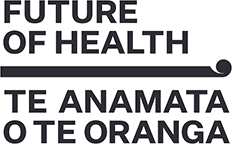Update from the Transition Unit - Thursday 9 December 2021
Download a printable version of the newsletter:
Update from the Transition Unit - Thursday 9 December 2021 [PDF, 1.8 MB]
Health workforce critical to reform
Kia ora,
Our plans to transform Aotearoa New Zealand’s health system are ambitious, and crucial to making it happen is the involvement of our dedicated health workforce.
Over the last few weeks I’ve been pleased to meet with members of the health workforce as part of a national roadshow sharing information about the reform. Some similar questions have emerged during these meetings, including why we’re reforming the health system now, when we’re responding to a pandemic, and what the changes mean for those working in the health workforce.
On the first point, COVID-19 has shone a light on why a strong and effective public health response and strong health system are so important for our future. It has also provided examples of what we can achieve when different parts of the system work together with a common goal.
The transformation of the health sector will enable us to take a whole-of-country view to planning and delivering services while strengthening public and population health. It will work to address long-standing inequities and ensure the system operates with efficiency and consistency.
Our health system is under pressure. But we simply can’t wait to implement the changes that will address inequity and inconsistency. Making these changes now will mean we can respond to future demands and challenges more effectively, and we simply don’t have the luxury of time to wait until the pandemic is over to get started.
To the second point, I’ve been clear that the health system is understaffed. We need to do things differently to get the most out of what we have, as well as attracting people into the health workforce. We need more people in the health workforce, not fewer.
While the new entities Health New Zealand and the Māori Health Authority both come into effect on 1 July 2022, we will minimise disruption as much as possible during the transition to ensure the sector can continue to focus on providing the healthcare that New Zealanders need.
Thank you to everyone who has taken the time to attend these health reform roadshow sessions. It’s really encouraging to note that over 3,000 people have participated in the roadshows to date, and had the opportunity to learn more about this once-in-a-generation transformation of the health system. For those of you keen to learn more about the reform, look out for more information in the New Year about future engagement sessions.
Ngā mihi,
Hon. Andrew Little, Minister of Health
Long list of potential locality prototypes confirmed
The Transition Unit (TU), on behalf of the interim entities Health New Zealand and Māori Health Authority, has confirmed the long list of areas of interest where locality prototypes may be developed.
Over recent months the TU has gathered information from the sector and developed a set of parameters that will ensure as much insight as possible from the locality prototypes.
“These prototypes are intended to create a rich learning environment to inform the rollout of localities across the country,” Co-Director Localities, Helen Parker, said.
“We have taken a targeted approach to identifying a long list of localities which could be prototypes based on agreed parameters and criteria.
“The parameters were designed to ensure the mix of locality prototypes would cover a range of geographic and community profiles while also prioritising areas where the opportunity to impact on health outcomes is greatest.”
The TU has been in touch with the sector to confirm the long list, and the next steps.
“From here we will be working with the localities of interest to further develop the opportunity within each of these areas, with a view of having the first prototypes confirmed and established in the first quarter of 2022,” Helen said.
“It’s important to note that other areas in the country are continuing their work in developing a locality approach and we will be working with them throughout the phased rollout of localities. Further localities will be confirmed and established as the approach extends across the motu.”
The long list of areas that the TU is working with on locality prototypes, on behalf of interim Health New Zealand and the interim Māori Health Authority, is:
- Northland
- Counties Manukau
- Waikato
- Lakes
- Bay of Plenty
- Tairāwhiti
- Hawke’s Bay
- Whanganui
- Mid Central
- Capital and Coast
- West Coast
- Canterbury
- Southern
Shifting the system – the role of data and digital
The vision for the future health system is one that is people-centred, equitable, accessible and cohesive.
To achieve that vision, the Transition Unit is focused on five key areas that we want to see significant change, referred to as 'system shifts'. In this edition, we look at how shifting the system to make better use of health data and digital services will mean more people can get the care they need in their homes and communities.
We are building a future health system where people:
- get the care they need sooner, preventing illnesses from escalating
- are able to get the help they need in their communities, or even their own homes, preventing the need to visit a hospital
- and have a good experience of the public health system which demonstrates integration and consistency.
The role that health data and digital services and platforms play in achieving this future health system is substantial.
The Health and Disability System Review highlighted issues with the current system and the way it used data and digital; underinvestment had resulted in siloed systems, data couldn’t easily be shared and opportunities to take advantage of new technology to improve access were being missed. The reform of the health system has a clear focus on using data and digital to transform the way healthcare is provided.
While we collect a lot of data at the moment, we often don’t make good use of it. Better sharing of data throughout the system will make sure the right people have the right information about a person’s care – making for a more seamless experience of getting care. There will be a stronger emphasis on consumer-centred care, particularly to target disparities, and to give people and whānau enhanced knowledge of their health, empowering them to obtain, and maintain, health.
Digital technology also provides significant opportunities to do things differently. For example, health services delivered over a digital (virtual) environment can remove numerous barriers to people receiving care. It will remove the need for people to travel to get the care they need, and locations that struggle to attract and retain healthcare workers can take advantage of knowledge and expertise, delivered over a digital environment. Making progress in this area will require addressing some barriers that exist in some places, including lack of connectivity (blackspots/no wifi), access to devices, and digital literacy. The important thing is that investment in digital services does not leave people behind.
For the health workforce, more effective use of data will support better decision-making and collaboration across different teams and regional areas.
At a system level, real-time information about risk and performance will support the system to respond with a population-health focus, where early intervention and prevention of chronic illness is a priority.
Getting the use of data and digital right is a big job, and it will take time to get it right. As a first step the Transition Unit is working to support Health New Zealand, when it becomes a permanent entity on 1 July 2022, to set up the right structures and environment to uplift digital and data maturity quickly. This will include getting the right balance between national and regional planning and delivery, where further opportunities can easily be developed, shared and scaled.
Health Reform roadshow attendees top 3,000
Over the last six weeks the Health Reform Transition Unit has been out around the motu visiting towns and cities to talk about the transformation of the health system.
So far, the Transition Unit has held sessions for the health sector in 18 different locations. More than 3,000 people have joined in on the sessions, through a mix of in-person and online attendance, which Health Reform Transition Unit Director Stephen McKernan said was a great result.
“The health workforce is under pressure responding to the COVID-19 pandemic and we appreciate it is a big ask for them to take time out of their day to learn more about the health reform,” Stephen said.
“Our focus remains on ensuring as minimal disruption as possible as we transition to the new system in 2022.”
The roadshows have focused on the key elements that will change with the new system, including establishing the Māori Health Authority and Health New Zealand, which will be an amalgamation of the 20 District Health Boards.
The new system also introduces a local approach to planning and commissioning health services based on “localities”.
“Localities will be a unique feature of the new health system,” Stephen said.
“We’re hearing how the those working in primary and community care settings are looking forward to the opportunity to do things differently at a local level, including integration across service providers and stronger relationships with Iwi and hapu through the Iwi Māori Partnership Boards.”
Roadshow sessions will continue in a number of North Island locations over the next two weeks.
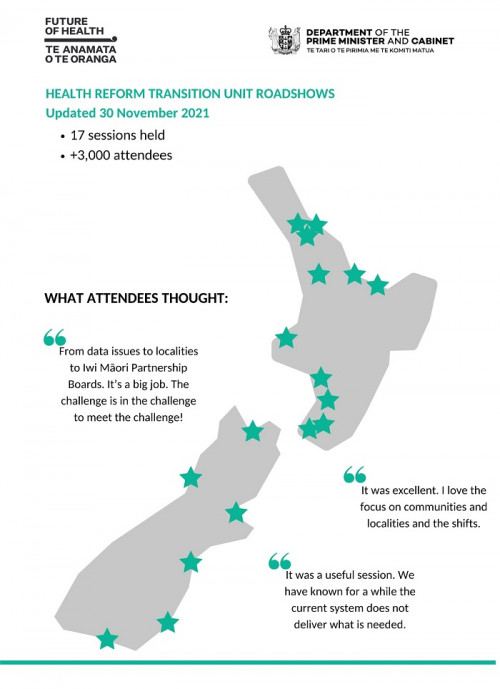
What attendees thought
We asked attendees what they thought of the sessions they took part in. Here’s what they had to say.
Kelly Isles from Think Hauora and Fiona Bradley and Carol Bateman from MidCentral Community Pharmacy Group attended the Palmerston North session.
Kelly: “Taking a wider system approach – understanding that this isn’t about centralising everything. It’s about being smart and efficient in how we support things from the centre, but with strong involvement from iwi and communities.”
Fiona: “Hearing from Minister Little how localities will work, and how community partnerships will work – we’ve heard the words but not how they’d work until today. That was great.”
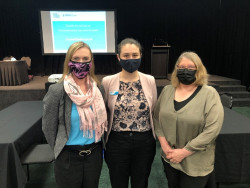
Kelly Isles from Think Hauora (left), and Fiona Bradley (centre) and Carol Bateman (right) from MidCentral Community Pharmacy Group
Christine Pihema said: “I came along to see what you’re doing to make a difference, a real difference, for Māori. We’re not there yet, but it’s on the right track.”
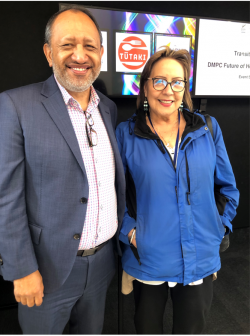
Bernard te Paa (left) from the Health Reform Transition Unit’s Hauora Māori team with Christine Pihema (right).
Iride McCloy said: “It was excellent. I love the focus on communities and localities and the shifts – but don’t forget the importance of mental health.”
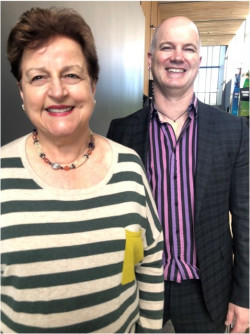
Iride McCloy (left), with Health Reform Transition Unit session facilitator Carl Billington (right)
Members of the Bay of Plenty DHB Health Consumer Council Adrienne von Tunzelmann and John Powell, and Bay of Plenty DHB Board member Ron Scott said:
Adrienne: “The biggest insight I got from today was a better sense of the breadth and scale of the new system. Until now, my focus has been on the consumer voice, so it was useful to see the size of the change.”
John: “It was a useful session. We have known for a while the current system does not deliver what is needed. I was encouraged by the comments about engaging more with consumers. I hope to participate more. We all have a stake in this.”
Ron: “From data issues to localities to Iwi Māori Partnership Boards. It’s a big job. The challenge is in the challenge to meet the challenge!”
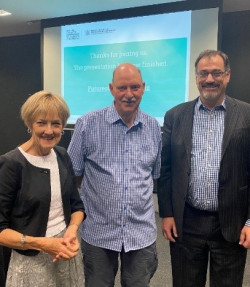
Members of the Bay of Plenty DHB Health Consumer Council Adrienne von Tunzelmann (left) and John Powell (centre) with Bay of Plenty DHB Board member Ron Scott (right).
Submissions on the Pae Ora (Healthy Futures) Bill closing
Today marks the final day people have to make a submission on the Pae Ora (Healthy Futures) Bill that will underpin transformation of New Zealand’s health system.
The bill provides for a new structure and accountability arrangements for the publicly funded health system, in order to protect, promote, and improve the health of all New Zealanders.
Parliament has established a special select committee (the Pae Ora Legislation Committee) to consider the Bill. The special select committee has six months to consider the Bill before preparing a report for the House ahead of the second reading of the Bill.
Visit the Pae Ora Legislation Select Committee webpage(external link)
People of the Transition Unit – Ririwai Fox
In this edition, we meet Ririwai Fox who is a self-described “swiss army knife” working within the Hauora Māori team.
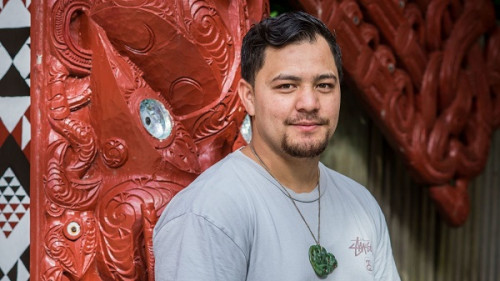
Tell us a little about yourself
I come from a shearing family in the Wairarapa, where I learned the value of hard work. But I was fortunate to have a mother who had a strong focus on education. So I spent my early years in the shearing and meat industry until I embarked on my education journey. I completed an undergraduate in Psychology and then an Honours degree while completing the first year of my Postgraduate Diploma in Clinical Psychology. From there, I deferred to complete a PhD which I should submit in 2022. From there I’ll go back and complete my Clinical Psychology training.
I was also raised and educated through Kōhanga Reo and Kura Kaupapa Māori. Through this upbringing, I am privileged to be embedded in te ao Māori, with an intricate understanding of Māori values, beliefs, and practices, and an ability to apply these in practice.
What’s your role as part of the health reform?
I work in the Hauora Māori team as a Swiss army knife. Essentially my role is to support the establishment of the Māori Health Authority and ensure that the reformed health system has meaningfully considered Te Tiriti o Waitangi obligations. As is often the case with Māori input, I work with the wider Hauora Māori team to provide advice across the wide array of workstreams that will be influenced and impacted by the Māori Health Authority.
What are you working on at the moment?
I am currently working on Day 1 data and digital on the Māori Health Authority workstream, ensuring that issues such as Māori data sovereignty are addressed. I am also writing a Te Tiriti o Waitangi and Equity framework to support all workstreams in considering whether they have adequately considered and integrated equity and Te Tiriti o Waitangi principles into their mahi.
What happens next?
On paper, I will be one of the first Māori Health Authority staff members as the interim measures begin. A lot of work has gone into developing each section of the reformed health system. What’s next is to bring it all together and make sure all of the pieces work together in collaboration.
What is your advice to the sector?
Be brave and transformative. This is an amazing opportunity to make a substantial and meaningful difference to the lives of all people in Aotearoa. [PDF, 1.8 MB]
